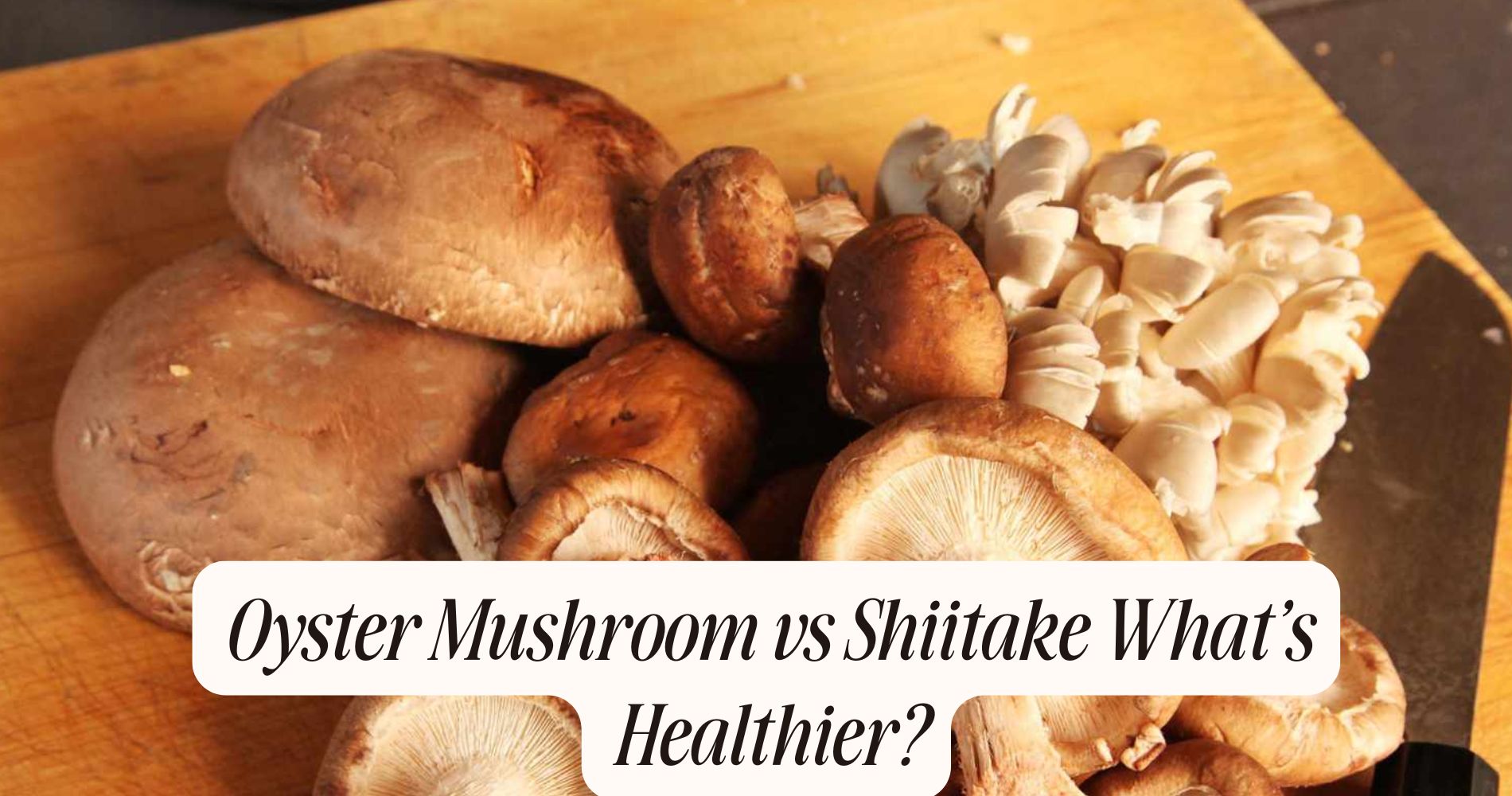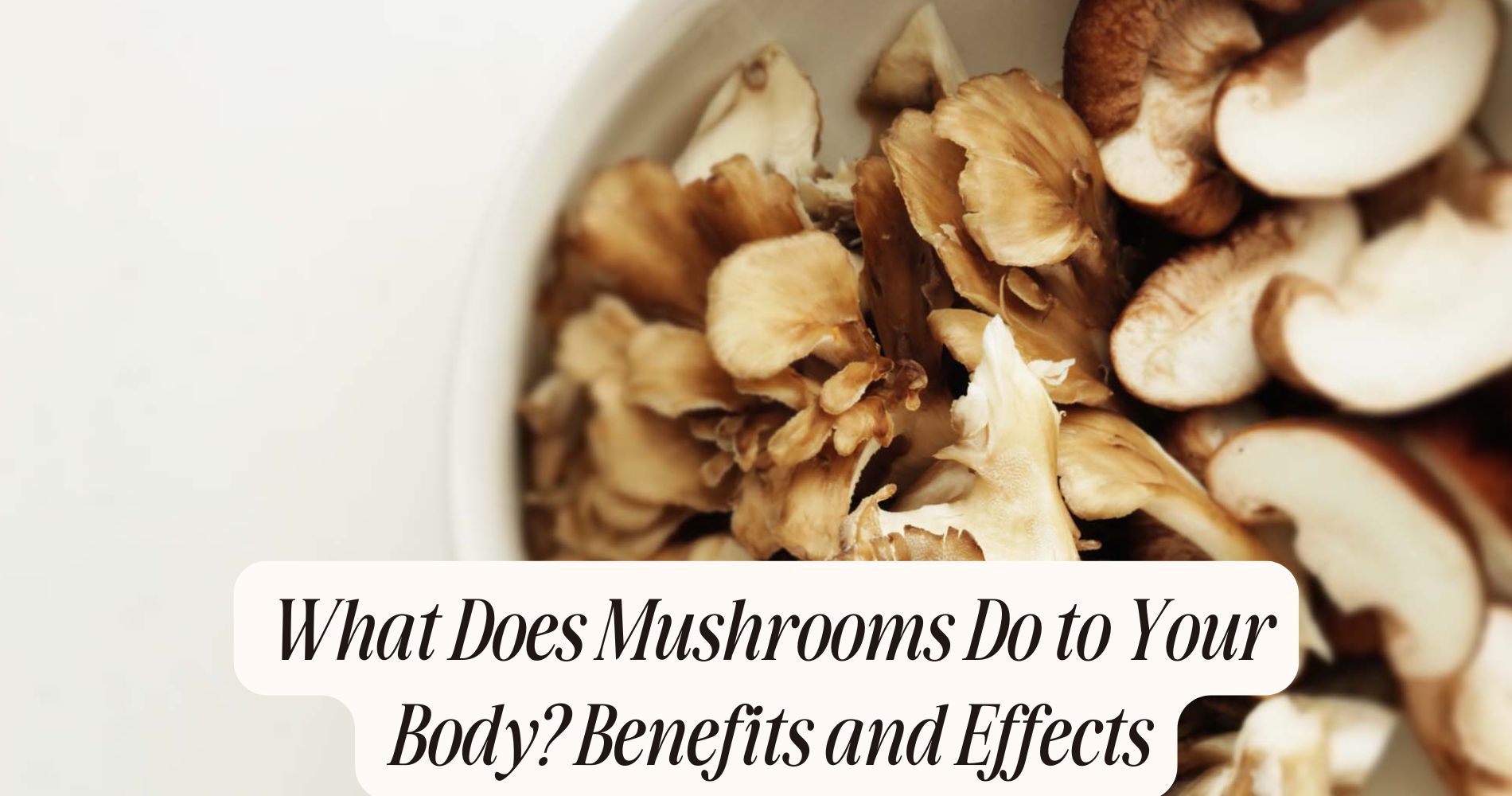
Oyster Mushroom vs Shiitake What’s Healthier?
When it comes to choosing between oyster mushrooms and shiitake, you might wonder which one offers more health benefits. Both types have their unique nutritional advantages. Oyster mushrooms are lower in calories and fat, while shiitake mushrooms are packed with immune-boosting compounds. Understanding how each can fit into your dietary needs is essential. So, which one aligns better with your health goals? Let's explore their benefits and culinary uses further.
Nutritional Comparison of Oyster and Shiitake Mushrooms
When you compare the nutritional profiles of oyster and shiitake mushrooms, you'll find distinct benefits that cater to different dietary needs.
Oyster mushrooms are lower in calories and fat while providing a decent amount of protein and fiber, making them a great option for those watching their weight.

On the other hand, shiitake mushrooms boast higher nutrient density, offering a richer source of vitamins like B2 and D, along with essential minerals such as copper and selenium.
The cooking methods you choose can also affect their nutritional value; sautéing or steaming retains more nutrients than frying.
Both mushrooms are versatile, enhancing various dishes, so incorporating them into your diet can provide unique flavors and health benefits.
Health Benefits of Oyster Mushrooms
Oyster mushrooms pack a variety of health benefits that can support your overall well-being.
These fungi are rich in essential nutrients, including vitamins B and D, which are crucial for energy production and bone health. You’ll appreciate their immune support capabilities, as studies show they can enhance your body's defense mechanisms.

Additionally, oyster mushrooms boast impressive antioxidant properties, helping to fight oxidative stress and reduce inflammation. By incorporating them into your diet, you can potentially lower the risk of chronic diseases.
Their low-calorie count and high fiber content make them an excellent choice for weight management too.
Health Benefits of Shiitake Mushrooms
Although shiitake mushrooms are often celebrated for their rich flavor, they also offer a wide range of health benefits that can greatly enhance your diet. These mushrooms are packed with polysaccharides like lentinans, which are known to boost immune support. Regular consumption can help your body fend off infections and improve overall health.
Additionally, shiitake mushrooms contain compounds that may promote heart health by lowering cholesterol levels and improving blood circulation. Their high antioxidant content also contributes to reducing inflammation, which is beneficial for cardiovascular wellness.

Culinary Uses and Flavor Profiles
While both oyster and shiitake mushrooms bring unique flavors to the table, their culinary uses and taste profiles differ considerably.
Oyster mushrooms have a mild, slightly sweet flavor and are versatile in various cooking techniques. You can sauté, grill, or stir-fry them, and they pair well with ingredients like garlic, herbs, and seafood.
On the other hand, shiitake mushrooms offer a more robust, earthy flavor. They’re often used in Asian cuisines, making them perfect for soups, stir-fries, and risottos. Their meaty texture enhances dishes, especially when paired with soy sauce, ginger, or sesame.
Understanding these flavor pairings and cooking techniques can elevate your meals, allowing you to enjoy the best of both mushroom varieties.
Final Thoughts on Choosing Between Oyster and Shiitake Mushrooms
When deciding between oyster and shiitake mushrooms, it’s essential to evaluate both health benefits and personal preferences.
Oyster mushrooms are low in calories and rich in antioxidants, making them a great choice for a health-conscious diet. If you're focused on boosting your immune system, shiitake mushrooms may be the way to go due to their higher beta-glucan content.

Consider your taste preferences, too. Oyster mushrooms offer a delicate, mild flavor, while shiitakes have a more robust, earthy taste.
Your cooking methods will also influence your choice; oyster mushrooms sauté quickly and complement light dishes, whereas shiitakes hold up well in stir-fries and soups.
Ultimately, both mushrooms are nutritious options, so it might be worth incorporating both into your meals for variety.
Experience the Power of 10 Mushrooms in One Delicious Gummy
Can’t choose between oyster and shiitake? Why not enjoy both—and more? With SUPER MUSHROOM GUMMIES by Well Gummies, you get the benefits of 10 powerful mushroom varieties in one convenient, chewable form. Fuel your brain, body, and immune system naturally with our vegan-friendly formula designed to deliver calmer energy, sharper focus, and enhanced well-being. Plus, they taste like wild berries—as delicious as your favorite candy. No jitters, no crash—just clean, balanced energy to help you shine all day.
Frequently Asked Questions
Are Oyster Mushrooms More Sustainable Than Shiitake Mushrooms?
When evaluating sustainability practices, oyster mushrooms typically have a lower environmental impact than shiitake mushrooms. They often require less water and space, making them a more eco-friendly choice for sustainable cultivation in various settings.
Can You Eat Oyster and Shiitake Mushrooms Raw?
You can eat oyster and shiitake mushrooms raw, but cooking enhances their nutritional benefits and flavor. While raw consumption is safe, cooking reduces potential toxins in shiitake mushrooms, ensuring a healthier choice for your meals.
How Do Oyster and Shiitake Mushrooms Grow?
Oyster and shiitake mushrooms thrive in specific growth conditions. You’ll find oyster mushrooms flourish on straw or wood, while shiitake prefers hardwood logs. Both require proper moisture and temperature for successful mushroom cultivation.
Are There Any Known Allergens for Either Mushroom Type?
Yes, both oyster and shiitake mushrooms can cause allergic reactions in some individuals. Mushroom allergies are relatively rare, but if you experience symptoms like itching or swelling after consumption, consult a healthcare professional for guidance.
What Is the Shelf Life of Oyster Versus Shiitake Mushrooms?
The shelf life of oyster mushrooms is about 4-7 days, while shiitake mushrooms last 7-14 days. Store them in a paper bag in the fridge for ideal freshness and to extend their shelf life.
Conclusion
When it comes to choosing between oyster and shiitake mushrooms, it really depends on your health goals and taste preferences. If you’re looking for a low-calorie option with essential vitamins, oyster mushrooms are a great choice. However, if you want nutrient density and immune-boosting properties, shiitake mushrooms might be more beneficial. Both types offer unique advantages, so incorporating a variety of mushrooms into your diet can help you reap the full spectrum of their health benefits.




